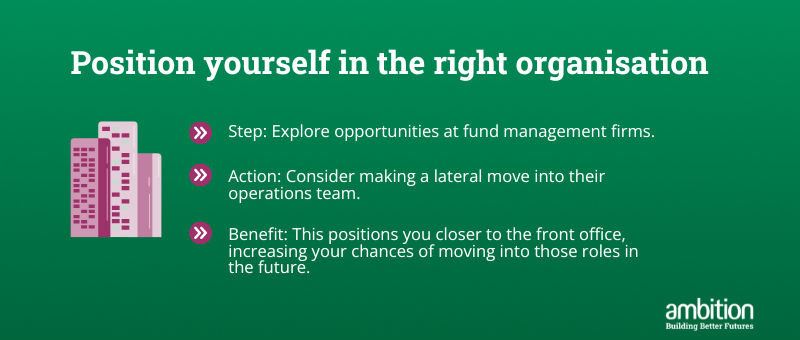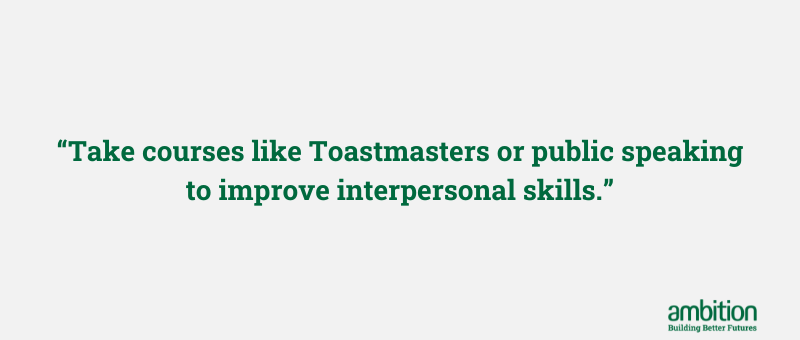Career insights with Ambition podcast
The podcast that dives deep into the defining moments of influential business leaders across technology, accounting and finance.

The podcast that dives deep into the defining moments of influential business leaders across technology, accounting and finance.

The podcast that dives deep into the defining moments of influential business leaders across technology, accounting and finance.

The podcast that dives deep into the defining moments of influential business leaders across technology, accounting and finance.



Transitioning from an operational role to the front office in banking and finance is a common career aspiration. This move can bring you closer to the investment decision-making process and offer challenging roles, exciting career growth opportunities, and higher potential salaries. Here’s a step-by-step guide to help you successfully make this transition.
When looking to transition to a front office role, it's important first to assess if that growth is possible in your current role.
Step: Evaluate your current workplace.
Action: Determine if your current organisation has a front office.
Advice: If you’re in a custodian or asset servicing firm, your career growth may be limited to operations or finance roles.
Once you have assessed your opportunity for growth within your current business, you will then be able to decide whether you need to move roles to increase your chances of progression.
Step: Explore opportunities at fund management firms.
Action: Consider making a lateral move into their operations team.
Benefit: This positions you closer to the front office, increasing your chances of moving into those roles in the future.
So, you've established that your organisation has a front office, next you can indentify which roles are available with clear paths for progression.
Step: Identify roles with clear paths to the front office.
Action: Look for entry-level roles in unit pricing, performance analysis, or similar fields.
Advice: These roles can serve as stepping stones toward investment analysis and other front office positions.
Once you have chosen the right path for you, you can concentrate on honing your skills and building a solid track record in the related field.
Step: Build your track record.
Action: Focus on developing your skills and establishing a strong performance record in these related areas.
Benefit: A solid track record makes you a standout candidate for front office roles.

If you have decided to move on from your current organisation, it is a good idea to pay attention to smaller financial firms that tend to offer on-the-job training.
Step: Research smaller firms.
Action: Identify smaller financial organisations that might offer opportunities to transition directly into the front office.
Benefit: Smaller firms are often more flexible and willing to provide on-the-job training.
Did you know there is a 'try before you buy' option? Why not check out contract roles? That way you get a foot in the door and gain some experience.
Step: Consider contract positions.
Action: Look for contract roles that align with your career goals.
Benefit: These positions often have lower competition and experience requirements.
Check out our blog on "The Life of the Contractor".
If you perform well in a contract role and you enjoy working in the team, there would be a high chance your contract would be extended, or better yet, taken on permanently.
Step: Excel in your role.
Action: Perform exceptionally well in your contract position.
Outcome: High performance can lead to increased internal mobility and better opportunities.
Even if you haven't yet started a role within a front office team, make yourself known to them through building relationships.
Step: Develop close working relationships.
Action: Network with colleagues and front office teams - build strong professional relationships.
Benefit: Being known and respected can increase your chances of landing a front office role.
Get involved in whatever opportunities come your way, this is a great way to network and understand other parts of the business.
Step: Participate in projects and events.
Action: Volunteer for projects and participate in social and charitable events.
Benefit: This provides valuable exposure to front office teams and senior management.

Devoting some time to develop your interpersonal skills is beneficial. A person with strong interpersonal skills able to communicate effectively, solve problems, work well in a team, and maintain strong relationships with others,
Step: Invest in professional development.
Action: Take courses like Toastmasters or public speaking to improve interpersonal skills.
Benefit: These skills are highly valued in front office positions.
If you are able to invest in a certification like the CFA, you may outshine other applicants without this designation when competing for a new role.
Step: Pursue relevant certifications.
Action: Obtain certifications such as the Chartered Financial Analyst (CFA).
Benefit: Certifications increase your knowledge, credibility, and chances of making the transition.
Transitioning from operational roles to the front office in banking and finance requires strategic planning, skill development, and networking. By positioning yourself in the right organisation, exploring relevant career paths, leveraging contract roles, building strong networks, and upskilling, you can successfully make this career shift and enjoy the benefits of front office roles.
For more insights on achieving career growth in investment operations, please take a look at our blog "How to achieve career growth in the competitive world of investment operations".
Reach out to Charlie Fitzroy for any further advice on this topic.
Author Charlie Fitzroy has been recruiting in the banking and financial services team across the Sydney market since 2011. Charlie has an in-depth knowledge of wealth management, fund administration and financial market operations.
Edited by Melanie Brown, Marketing Executive, Ambition Group Australia.